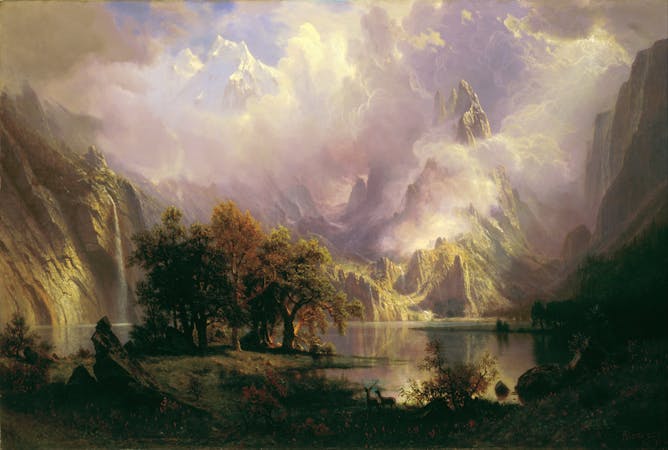|
It is fairly obvious by now that the climate crisis cannot be addressed only through technological solutions: it also requires profound cultural shifts. Because of this, fiction about climate change will be immensely useful when navigating our way through the crisis: it allows us to sift through possible futures. And it's not only contemporary fiction that we can turn to – historical fiction can teach us a lot about this intensely modern problem too, as David Higgins and Tess Somervell explain. Historical depictions of nature show us that our attitude towards the environment can and should change. Richard Calland, meanwhile, explores how populist leaders can drive denialist narratives around climate change.
|

Albert Bierstadt, Rocky Mountain Landscape, 1870.
David Higgins, University of Leeds; Tess Somervell, University of Leeds
Literature of the past can help us to make the cultural shift that's necessary to address climate change.
|

Environmental activists from Extinction Rebellion protest in Pretoria, South Africa.
EFE-EPA/Kim Ludbrook
Richard Calland, University of Cape Town
Global cooperation is essential if climate action is to be effective, amid the right-wing onslaught against multilateralism.
|
Arts + Culture
|

Chuka Onwumechili, Howard University
FIFA’s six-month receivership in Africa has left a mark on African football.
| |

Agata Lulkowska, Staffordshire University
It's the first non-English language film to win best picture – here's hoping this is the start of something big for world cinema.
|
|
|
Science + Technology
|

Paul Kyberd, Brunel University London
When scientists created the Higgs particle with protons, they needed the 10km-wide Large Hadron Collider. A muon machine could achieve it with a diameter of just 200 metres.
| |

Femke Holwerda, Utrecht University
Teeth can reveal a lot about diversity when they are reasonably well-preserved.
|
|
|
En español
|

Nuria Ferrer Ramos, Universitat Politècnica de Catalunya - BarcelonaTech
Si bien los datos sugieren que las industrias tiene un impacto mínimo, las cosas podrían cambiar.
| |

Nuria Máximo Bocanegra, Universidad Rey Juan Carlos
En la actualidad, cuatro de cada diez familias españolas tienen al menos una mascota. Según los últimos estudios, esto supone un beneficio para la salud mental.
|
|
|